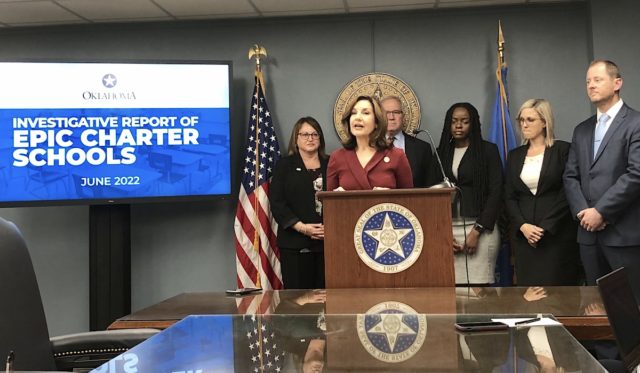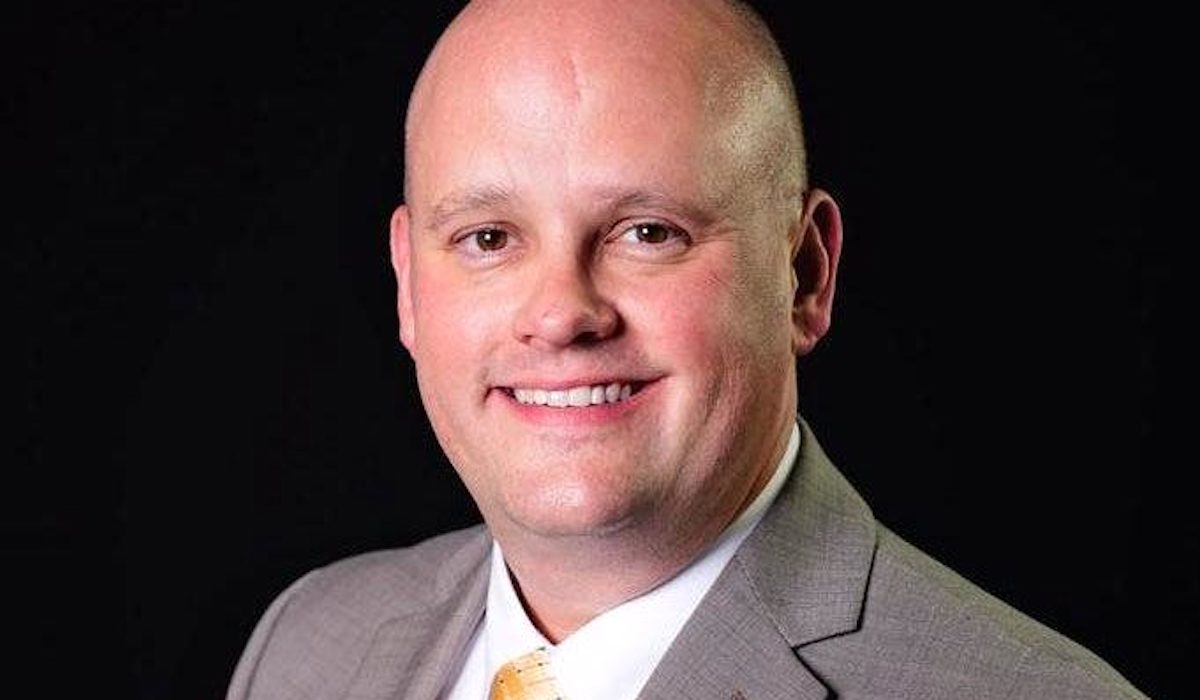

After years of allegations about improperly reported student enrollment data by Epic Charter Schools, the Oklahoma State Department of Education released a 76-page report today outlining alleged attendance fraud, Open Meeting Act violations and “improper, unapproved and excessive” bonuses paid to Superintendent Bart Banfield.
During a 40-minute press conference, flanked by agency investigators, State Superintendent of Education Joy Hofmeister outlined extensive findings about how the controversial charter schools appear to have manipulated student enrollment and attendance data to retain per-pupil payments from the state agency.
Hofmeister said she would recommend that the State Board of Education place Epic Charter Schools on probation at a July meeting.
“They certainly meet the qualifications for that, and a very close working (relationship) and accountability — more regularly than annually — will be required of them,” Hofmeister said, noting that the board will have the ultimate decision on her proposed probation for Epic.
OSDE, Epic staff had a ‘positive conversation’
The new Epic report (linked below) comes roughly two years after the charter schools overhauled their leadership and went through a robust corrective action plan at OSDE’s direction. Epic terminated its relationship with school founder Ben Harris and David Chaney, as well as with Epic Youth Services, the private management company owned by Harris and Chaney.
Oklahoma County District Attorney David Prater is in the process of reviewing the findings of a years-long criminal investigation into Harris, Chaney and EYS. Prater said Tuesday that his review of the prior Epic allegations remains ongoing and that he would be reviewing the OSDE’s new findings as well.
“I was just forwarded the new report,” Prater said.
Hofmeister and OSDE legal counsel Brad Clark said Tuesday that the findings in the new report — which covers the 2020-2021 school years — would be turned over to Prater, State Auditor & Inspector Cindy Byrd and potentially other authorities. Hofmeister said her agency’s new inquiry began after a former board member of Community Strategies — the nonprofit governing board of Epic Charter Schools — resigned suddenly in December and submitted a letter alleging questionable behavior by board Chairman Paul Campbell and unapproved staff bonuses
“We’ve spent hundreds, if not thousands, of hours looking into these complaint allegations, and a large part of that was really invested in talking with Epic staff,” Clark said.
OSDE executives met with Epic representatives from 9 a.m. until about noon to discuss the report released today, Clark said.
“Overall, I hope the takeaway was that it was a positive conversation,” Clark said. “[We are] committed to a partnership in making sure these issues don’t come up again.”
As Epic staff members exited their meeting with OSDE on Tuesday, Campbell described his priorities.
“I’m consistently on point about student outcomes and what is best for students,” Campbell said. “I don’t care how you twist any facts or imply anything that you want, anyone that is going to spend time with me is going to see that I am focused on improving the lives of Oklahoma students each and every day. That is why I’m volunteering for this.”
Banfield requested more time to review and respond to the new OSDE report. Asked if he believed the bonuses paid to him were improper, Banfield replied, “No.”
Epic outlines its own concerns, actions

About an hour after the end of Hofmeister’s press conference, Epic called its own gathering to respond to the new report.
“Through our own proactive investigations and previous state investigations, we are well aware of the challenges we still face organization-wide,” Banfield said. “But here is what I can promise you. We have a new Board of Education and new executive leadership team committed to uncovering all and any issues and securing compliance with the State Department of Education.”
According to the OSDE report, Banfield received $67,500 in bonus payments, about 50 percent higher than the $40,000 figure he was authorized to receive by the board.
Banfield said Epic has already reversed its prior “pay for performance” bonus system, which was described in the OSDE report.
“The bonus compensation structure for Epic employees paradoxically incentivizes employees to both not withdraw students for truancy (to increase regularly monthly compensation, which is based on enrollment counts) and to withdraw students for truancy at certain times of the school year (to increase their bonus payout and for student performance measures),” the OSDE report states.
That element of the report ties to the other primary finding, which involves an alleged algorithmic attendance reporting scheme that prevented students from being unenrolled from Epic if they did not complete an instructional activity for 15 straight days.
“Oklahoma law requires a virtual charter school to withdraw a student (and no longer count in membership for funding) who is absent from school for 15 consecutive days and is not on pace,” the OSDE report states. “For the 2020-21 school year, there were 6,720 instances among 4,819 unique students where a student had a demonstrated pattern of being absent for 14 consecutive school days, was marked present on the next (15th) day, then was absent for 14 more consecutive days.”
Clark said Epic appeared to have used some sort of computer algorithm that recorded student activities in a way that stopped students from being unenrolled after extended absences. Clark said the algorithm appeared to have been built by a company called Futuristic Education, but he said he did not know who owns the company.
The company appears to be owned by a man named Gregory Scott, a computer programer from Newkirk.
Banfield said his team would be investigating the algorithm situation further.
“We have the same concerns as the OSDE regarding the algorithm and how it may be impacting our student enrollment report,” he said. “This will take additional in-depth investigations by programmers who can understand the impact this software has on the data certified by Epic and shared with the OSDE.”
The OSDE report also questions Epic’s enrollment practices related to students starting school.
“Epic enrolled 4,569 students in school year 2020-2021 who were marked absent on their first date enrolled. For these students, there were on average 8.5 days between the first day of enrollment and when the students were first marked as completing an instructional activity. Oklahoma laws and regulations prohibit this and instead require that a student be counted present and on membership rosters upon the first day of completing an instructional activity. The impact of this alone could have erroneously added approximately 39,000 days of student enrollment and membership, which in financial terms amounts to approximately $780,000.”
Overall, OSDE leadership said their report uncovered concerning issues.
“We are seeing repeat issues come up across a variety of subjects,” Clark said.
But Hofmeister expressed optimism for the future of Epic, even as she plans to request that its accreditation be placed on probation.
“I am confident that Epic can repair, and there is an opportunity to make those changes,” Hofmeister said. “It is entirely on their board and the community there to determine what steps [will be taken].”
Read the new OSDE report on Epic Charter Schools




















